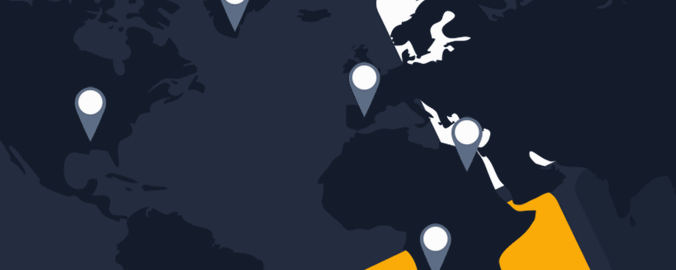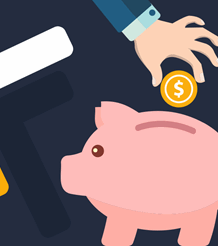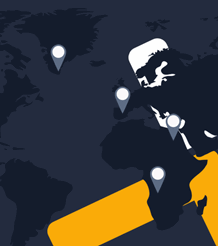
Area Guide to the United Arab Emirates
Established in 1971, the UAE is a constitutional federation of seven emirates: Abu Dhabi, Dubai, Sharjah, Ajman, Umm al-Qaiwain, Ras al-Khaimah and Fujairah.
Located on the south-eastern tip of the Arabian Peninsula, Qatar lies to the west, Saudi Arabia to the south and west, and Oman to the north and east.
Although each of the emirates maintains a high degree of independence, the UAE is globally governed by a Supreme Council of Rulers, made up of seven emirs who are responsible for appointing the prime minister and the cabinet.
A very brief outline of each emirate:
Abu Dhabi is the capital city of the UAE and sits within the wealthy, vibrant emirate of the same name. The discovery and export of oil in Abu Dhabi from 1962 has dramatically transformed the society and economy of this emirate into one of the wealthiest in the Gulf.
Dubai’s immense business sector and tourism industry have helped fuel its recent real estate boom, creating glistening skyscrapers and ground-breaking construction projects so far unequaled on this planet. This activity has been a major driver in making Dubai one of the most cosmopolitan and liberal of the United Arab Emirates. As a perfect tourist and expatriate destination, Dubai, and indeed much of the UAE, offers all the essential ingredients and more: sunshine, sand, sea, sports, tax-free shopping, top hotels, restaurants and an intriguing culture.
Ajman is the smallest of the emirates but is the second one, after Dubai, to offer freehold property to foreigners, attracting a huge number of investors to the emirate. Immense, government backed development projects are now underway to create ‘New Ajman’, a well-served business and residential conurbation just outside Ajman city centre.
Fujairah is located on a stunning beach strip and is undergoing a large number of exquisite hotel and resort projects to cater for the massive influx of luxury tourists to this emirate. Other industries include cement works and mining, while Fujairah’s flourishing free trade zone mimics that of Dubai, having expanded in vast proportions from 2003 to become the busiest port in the region.
Ras al-Khaimah is important as a sea port, providing bulk and container services to the area. Keeping up with the other emirates, Ras al-Khaimah is also undergoing mega tourism projects, many of which should be complete by 2011. With upgrades underway at the Ras Al Khaimah International Airport and as a member of the Open Skies Agreement, the airport offers a wide range of competitive flight options.
Sharjah is the third largest emirate in the UAE and the only one to have land on both the Persian Gulf and the Gulf of Oman. Sharjah is perhaps the least liberal of the emirates, forbidding the sale, possession of and consumption of alcohol, as well as keeping strict dress codes etc. It is famous as the cultural capital of the UAE and boasts the distinctive landmarks of two beautiful Islamic-designed covered souks.
Umm al-Qaiwain is the least populated of the seven emirates. Covering an area of 750m2, it is, however, now undergoing vast development projects to create residential and commercial facilities in brand new districts, all in a bid to help absorb the overflowing demand from Dubai for luxury tourist facilities. As a result, sales and rental costs in The Northern Emirates have been rising dramatically.
Information Required When Travelling to the UAE
Visas:
Simply take your travel documents to the immigration counter upon arrival and they will provide an on-the-spot short entry (visit) visa for one month
Vaccinations:
Recommended: Hepatitis A & B, Typhoid, Tetanus-diphtheria
Time Zone:
GMT +4 hours
Electricity:
220 volts
Weights and Measures:
Metric
Tel. Dialing Code:
00 + 971
Area Codes:
|
Abu Dhabi |
2 |
Fujairah |
9 |
Ras Al Khaimah |
7 |
|
Ajman |
6 |
Hatta |
4 |
Ruwais |
2 |
|
Al Ain |
3 |
Lihbab |
4 |
Sharjah |
6 |
|
Dubai |
4 |
Madinat Zayed |
2 |
Umm-Al Quwain |
6 |
Healthcare in the United Arab Emirates
Healthcare is important if you are re-location to any country but investors in property in Dubai should relax as their hospitals are excellent and offer a free or very low cost public health service for Dubai nationals and, in certain circumstances this is also open to expatriates and tourists.
For some time however, Dubai has been encouraging medical insurance for employees and in May 2007, it was announced that a unified health insurance system would be put into place. From 1st January 2008, all companies will have to insure their workers, while tourists with a visa for two months or more will also be required to have health insurance.
Although the Dubai health care system is also open to tourists for emergencies, they are advised to take out medical insurance to cover private medical treatment.
Many of the large projects such as Dubai Sports City include medical facilities in their plans and provide all main medical services, along with a 24-hour emergency service. Sports City, even offers sports medicine and rehabilitation clinics.
General Practitioners
GPs of many nationalities practice in Dubai making it possible to find a doctor who speaks your language. Doctors must have their qualifications verified by the Dubai Ministry of Health before they can begin work in the region. Many advertise in the yellow pages, but it is advisable to find one through recommendation or by asking at your embassy.
Most GPs work in clinics where it is usual to make an appointment although it is often possible to see a doctor immediately. Payment is expected at the time of the consultation and a receipt is issued so that fees can be reclaimed from your insurer.
Clinics have varied opening times, but the normal hours are between 9.00 am and 1.00 pm and again from 5.00 pm to 8.30 pm.
Hospitals
Hospitals and large clinics are open 24 hrs a day and patients are usually attended to immediately.
State-run Hospitals in Dubai:
- Al Wasl Hospital: +971 4 324 1111 (Za'abeel)
- New Dubai Hospital: +971 4 271 4444 (Deira)
- Rashid Hospital: +971 4 337 4000 / Accident and Emergency +971 4 337 1323 (Bur Dubai)
Private hospitals in Dubai have luxurious surroundings and the cost of these is directly related to the level of luxury you receive. Your medical insurance company will inform you whether there are any restrictions as to which hospitals you are allowed to use.
Water
Most of Dubai's water supply is from desalinated water and while this is perfectly safe to drink, the majority of the local population prefer to drink bottled water.
Pharmacies:
Most medicines are easily available in Dubai and at least one pharmacy in the city is open 24 hours. To find the duty pharmacy, look in the local press or phone the municipality emergency number: Dubai 04 2232323.
Most pharmacies are open from 9.30am to 1pm and from 4.30 to 8.30pm or later, Saturdays to Thursdays.
Emergency Numbers:
Emergency ambulance: 998
Police: 999
Cuisine in the United Arab Emirates
Arabic cuisine is standard fare throughout the UAE but, due to a huge influx of expatriates and tourists in Dubai and to some extent, Abu Dhabi, more international foods can now also be found in these emirates.
Main delicacies
- Mezze – a mixed starter which is normally served in restaurants and usually eaten with the hands, with the help of bread to scoop up the food.
- Hummus - chickpea dip/ spread
- Kibbe - meat patties made from minced lamb, bulghur wheat and onions
- Tabbuleh - salad of couscous or bulghur with diced tomatoes, onions, mint and parsley
- Baba ganush - aubergine or eggplant dip
- Kussa mahshi -stuffed courgettes (or zucchini)
- Warak enab - stuffed vine leaves
- Pitta bread -unleavened bread
- Felafel - chickpea patties rolled into balls, often served in pitta bread at corner stalls
- khuzi - a stuffed whole roast lamb on a bed of spiced rice
- Kebab Kashkash -a dish of meat and spices in a tomato sauce is favorite in UAE.
- Matchbous - spiced lamb with rice
- Esh asarya - a kind of cheese cake with cream topping
- Grilled chicken - also very popular at hotels and roadside cafes, and this is spiced up with relishes and other accompaniments such as Khubz (Arabic bread) or hummus (chick pea paste), etc.
Arabic Cuisine
Widely available in the Emirate, most of the Arabic food in Dubai is based on Lebanese cuisine. Common dishes are shawarmas (carved lamb or chicken carved from a spit and tucked into pita bread with salad and tahina), falafel (mashed chick peas and sesame seeds rolled into balls and deep fried), hummus (creamy chick pea and tahina dip) and tabbouleh (buckwheat mixed with parsley and mint). Most Arabic restaurants offer a good selection of fresh fruit juices to accompany the meal.
Emirati Cuisine
Local Emirati food blends ingredients imported from around Asia and the Middle East. Characteristic spices include cinnamon, saffron and turmeric, along with almonds, pistachios, limes and dried fruit. Dried limes are common in Emirati cuisine and reflect a Persian influence, giving dishes a distinctive tangy flavour.
Pork
Pork is difficult to come by in Dubai as it is taboo in Islamic culture and for this reason it is the priciest meat available. Should a restaurant offer pork, it would need to be kept in a separate fridge and prepared with separate utensils and equipment than the rest of the foodstuffs. Even supermarkets need to sell pork in a completely separate area from other meats.
Alcohol
Despite strict Muslim practice, the more “Westernised” of emirates, such as Dubai now offer alcohol in liquor stores and 5-star hotels. However, in Sharjah you can only drink in your home or in an expatriate bar called the Sharjah Wandereres and as a resident, you will need a liquor license allowing you to purchase alcohol.
Driving In The United Arab Emirates
Dubai has an excellent network of roads connecting the city and surrounding areas, with the Sheikh Zayed Road, the main arterial link in and out of the city. Two bridges and a tunnel link the two main districts Bur Dubai and Deira with each other. However, like many modern cities that have undergone rapid growth, Dubai is suffering the consequences of its success through the resulting congestion.
Toll System (Salik)
A round-the-clock toll system or congestion charge for vehicles travelling along the Shaik Zayed Road and Al Garhoud Bridge was imposed in Dubai from the beginning of July 2007. Charges are paid by means of a pre-paid sticker placed in the windscreen of the car and read by automatic readers as cars pass through the toll areas. Stickers can be bought at filling stations and certain banks.
Desert Driving
Roads in Dubai are usually excellent and there is no need for 4X4 vehicles unless you are intending to drive across the desert or take part in off-road activities; in which case, it is advisable to drive in convoy with people who do have local knowledge.
If you drive into the desert on your own, some basic precautions are essential:
Let someone know where you are going and when you expect to return. Carry at least one gallon of water per person per day. Don’t assume that your cell phone will work in the desert - it may not. Should you become stranded, stay with your car and signal. Don’t go walking off and get lost.
Regulations
An International Driver's Permit carried in conjunction with your national driving licence is recommended for driving in the UAE. Foreign licences are acceptable providing that you are a citizen or bona fide resident of the country that issued the licence. Make sure documentation is carried with you at all times when driving. Police officers will expect to see documentation if they stop you. Offer the IDP first, as the officer may need to retain it, thereby leaving you with your national driving licence with which to continue your journey.
All vehicles drive on the right hand side of the road.
Seatbelts, as in most advanced countries, are mandatory.
The UAE has a zero tolerance attitude towards drink/driving and the blood alcohol allowance is 0%. If you are caught drinking and driving, you could be sent directly to jail. Therefore taxis, which are widely available, are a far better option if you are drinking.
Crime & Police in the United Arab Emirates
Despite low crime figures, foreigners should take normal precautions against theft, such as not leaving a wallet, purse, or credit card unattended. Although vehicle break-ins in the UAE are rare, just as anywhere in the world, you should ensure that your unattended vehicle is locked and that your valuables are not in view.
If you lose your passport, report it immediately to the local police station and to the nearest embassy or consulate. They will assist you with funds transfer, contacting family or friends as well as medical care. Should you become involved in crime, consulate officers can also help you understand the UAE justice system and find you a lawyer if needed.
Some people are concerned about the possibility of terrorist attacks against US citizens and US interests throughout the world, so Americans are generally advised to maintain a low profile in the UAE.
The UAE is a convenient drug trans-shipment point because of its easy access from the Makran coast of Pakistan, where Afghan drugs are commonly trafficked. The UAE applies a zero tolerance policy towards illegal drugs and penalties can include life imprisonment or the death sentence. The government continues to tighten its drugs strategy by intensifying security at its air, land and sea ports. Coastal patrols, along with educational campaigns to reduce demand for illegal drugs, are helping the situation, while the enforcement of harsh penalties continues to deter a large number of drug criminals. A new barrier along the Omani border is being constructed, partly in an effort to slow/stop the flow of illicit drugs into the UAE.
Other crimes such as not paying a bill could mean prison, but bail is generally not available to non-residents of the UAE. Be aware that during Ramadan, Muslims fast during the day and drinking, smoking and eating in the street is forbidden.
While many of the more ‘Westernised’ emirates such as Dubai and Abu Dhabi are relatively tolerant of foreign visitors and their cultures, but other emirates such as Sharjah and Ajman still enforce strict Islamic law. The local population, both male and female, wears long loose clothes, covering up entirely. Foreigners do wear light summer clothing but shorts and skimpy clothes are often frowned upon. Finally, remember that kissing and any other public displays of affection can actually lead to arrest in the UAE.



